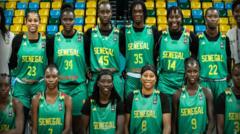Every day, Gora Fall, a fisherman in Senegal's northern city of Saint-Louis, heads to sea with a mix of emotions: hope and frustration. He hopes he will get a better catch than the previous day, yet he is frustrated by the thought that whatever he finds might not meet his needs. Before, we worked to live, but now we just work to survive, says the 25-year-old.
Like him, many other small-scale, traditional fishermen in Saint-Louis—a significant fishing hub—are facing hard times.
The BBC has spoken to several fishermen connected to the fishing trade, all pointing to a liquefied natural gas platform operating off the coast as the culprit behind dwindling fish stocks. The Greater Tortue Ahmeyim (GTA) gas project, managed by British multinational BP, is part of a joint venture with Kosmos Energy and local companies. BP's operations began in Senegal in 2017, aiming to produce around 2.3 million tonnes of liquefied natural gas annually for over 20 years.
However, the locals express that the fishing restrictions imposed by the project threaten their livelihoods—90% of the city's 250,000 residents depend on fishing. Fishermen like Fall are forced to observe a 500-meter exclusion zone around the gas platform, which has hampered their ability to find fish. The authorities forbid us to fish in that area of the platform, under penalty of confiscation or even destruction of our fishing equipment if we access it, he explains.
BP maintains that concerns over Senegalese fishing stocks predate the gas project and justifies safety zones to protect local fishermen and assets. The Senegalese government seeks a balance between oil and gas exploitation and fishing, which represents a vital job sector comprising nearly 60,000 direct jobs.
As fish stocks decline and competition from large trawlers intensifies, many locals are resorting to alternative work, with some migrating to Europe for better opportunities. BP has promised to build artificial reefs to compensate for the natural reefs affected by their operations, a commitment fishermen claim has yet to materialize. Amid ongoing disputes, local fishermen highlight that they feel increasingly squeezed out from their vital living space, asserting, We only have the sea to live on.
The plight of fishermen in Senegal thus underscores the tension between energy development and local livelihoods, raising questions about sustainable practices in the face of industrial expansion.
Like him, many other small-scale, traditional fishermen in Saint-Louis—a significant fishing hub—are facing hard times.
The BBC has spoken to several fishermen connected to the fishing trade, all pointing to a liquefied natural gas platform operating off the coast as the culprit behind dwindling fish stocks. The Greater Tortue Ahmeyim (GTA) gas project, managed by British multinational BP, is part of a joint venture with Kosmos Energy and local companies. BP's operations began in Senegal in 2017, aiming to produce around 2.3 million tonnes of liquefied natural gas annually for over 20 years.
However, the locals express that the fishing restrictions imposed by the project threaten their livelihoods—90% of the city's 250,000 residents depend on fishing. Fishermen like Fall are forced to observe a 500-meter exclusion zone around the gas platform, which has hampered their ability to find fish. The authorities forbid us to fish in that area of the platform, under penalty of confiscation or even destruction of our fishing equipment if we access it, he explains.
BP maintains that concerns over Senegalese fishing stocks predate the gas project and justifies safety zones to protect local fishermen and assets. The Senegalese government seeks a balance between oil and gas exploitation and fishing, which represents a vital job sector comprising nearly 60,000 direct jobs.
As fish stocks decline and competition from large trawlers intensifies, many locals are resorting to alternative work, with some migrating to Europe for better opportunities. BP has promised to build artificial reefs to compensate for the natural reefs affected by their operations, a commitment fishermen claim has yet to materialize. Amid ongoing disputes, local fishermen highlight that they feel increasingly squeezed out from their vital living space, asserting, We only have the sea to live on.
The plight of fishermen in Senegal thus underscores the tension between energy development and local livelihoods, raising questions about sustainable practices in the face of industrial expansion.





















